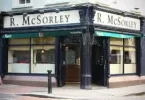VFI emphasises small pubs’ contribution
Nearly eight in 10 public houses have a turnover of less than €380,999 with 53% of all pubs having a turnover of less than €190,000 per annum. Indeed, only 4% of pubs nationally enjoyed turnovers greater than €1.27 million according to Revenue Commissioners’ figures.
The high proportion of pubs with turnovers less than €380,999 has been emphasised as part of the VFI’s 2017 pre-Budget Submission to government.
The Submission, sent to Finance Minister Michael Noonan and Paschal Donoghue, Minister for Public Enterprise & Reform, points out that despite the relatively small size of the enterprises, pubs are a significant source of employment across the country.
It’s estimated that approximately 40,000 of the 65,000 jobs generated by the drinks industry are in the pub sector. Many of these jobs are in areas where there’s little other employment available and are significant in the retention of people in geographic areas that would be otherwise challenged.
Alcohol Licences by County, September 2015
| Publican | |
| Carlow | 97 |
| Cavan | 190 |
| Clare | 291 |
| Cork | 954 |
| Donegal | 365 |
| Dublin | 773 |
| Galway | 475 |
| Kerry | 435 |
| Kildare | 183 |
| Kilkenny | 191 |
| Laois | 123 |
| Leitrim | 109 |
| Limerick | 360 |
| Longford | 90 |
| Louth | 182 |
| Mayo | 273 |
| Meath | 195 |
| Monaghan | 106 |
| Offaly | 126 |
| Roscommon | 203 |
| Sligo | 145 |
| Tipperary | 422 |
| Waterford | 220 |
| Westmeath | 169 |
| Wexford | 265 |
| Wicklow | 151 |
| Total: | 7193 |
“The pub trade has been particularly challenged over the last decade,” states the VFI in its Submission, “Between 2007 and 2015 the number of public houses decreased by 1,136 or 13.7%. This was somewhat more severe in rural areas where the decline was in excess of 15%. Between April 2007 and April 2016 (the latest CSO data available) the volume of bar sales decreased by 31%. This long-term volume decline has occurred despite substantial efforts by the sector to sustain business through more extensive and improved food offerings, increased marketing and promotion, refurbishment etc. During the same period overall retail sales excluding the motor industry remained static.
“There was some level of relief in 2015 with an increase in bar retail volumes of 4.8%. However, this was in the context of an economy growing in 2015 by 7.8% in terms of GDP and 5.7% in terms of GNP. Even in 2015 the performance of the trade was below that of the rest of industry generally.”
Consumer habits have changed considerably in Ireland over the past decade, points out the Submission. A decade ago 70% of all alcohol consumed in the country was consumed in the on-trade however most recent figures indicate that 60% is now consumed via the off-trade.
Excise
In calling for a 15% reduction in excise in the upcoming Budget, the VFI points out that excise is effectively a tax on jobs, tourism and development. The move would cost the State €170 million annually.
“Over the course of the last number of years there have been two increases in excise and an increase in VAT from 21% to 23%,” states the Submission, “This has resulted in an average increase in the price of a pint to the consumer of 29 cent. The CSO figures show that the price of a pint of stout on average increased during that period by 39 cent leaving the increase down to excise and VAT covering 74% of the total increase. Many publicans felt unable to pass on some or all of these increases due to falling volumes as outlined above and this has resulted in severe pressure on viability and sustainability.
“We now need to see the last of those excise increases reversed to help sustain the jobs and viability.”
Of this last increase VFI Chief Executive Padraig Cribben pointed out recently that, “That was an emergency tax brought in at the time and we’re now told that the emergency is ove so it’s tine to move on”.
Tourism
The 2003 Visitors Survey conducted by Fáilte Ireland reported that 80% of visitors had an interest in traditional culture, music, song and dance. That same survey showed the Irish pub was, for 80% of the tourists, the intended experience that influenced their decision to visit Ireland. That same survey again asked visitors what they participated in or where they visited while in Ireland. 83% said they listened to live music in a pub, the top response. 79% had tasted Guinness – number three on the list of priorities. Undeniably, therefore, the pub is a major part of the tourist experience.
However one of the negative aspects declared by visitors in similar surveys has been the high cost of alcohol here. This has been confirmed by recent Eurostat figures that put Ireland at the top of the European league on alcohol prices. The high cost of alcohol is down simply to the high level of excise and VAT. The VFI points out that comparisons with the rest of Europe bear this out.
Irish beer excise is 11.3 times the Spanish and 11.4 times the German level. Irish spirits excise in 2015 was 4.7 times the Spanish level and 2.5 times the French level.
“In essence, continued high levels of excise will erode the positive messages and development of the tourist sector,” points out the VFI.
Jobs
All enterprises such as pubs are providing jobs, supporting communities, purchasing from local suppliers, engaging local tradespeople in maintenance and refurbishment and generally playing vital parts in the life of communities, states the VFI.
A recent DIGI report shows the retail/wholesale/on- and off- sectors of the trade with a total labour cost of €567 million in wages and a salaries bill of €522 million based on the latest CSO data.
“In addition, there are food inputs of €250 million purchased and other services of approximately €550 million apart from food and drink,” states the Submission, “Excise needs to be reduced to help this regional development stabilise and grow.
“The Excise increases in 2012 and 2013 were introduced as part of the response to the financial crisis at the time. They are ultimately a tax on consumers. As all indications point to an end of the said financial crisis their measures should now be dismantled on a planned, phased basis. That should commence in Budget 2017.”
9% VAT Rate
Poor consumer sentiment and lack of disposable income led to the decreased volumes of alcohol sales outlined. This was mirrored by a fall in food consumption and absorption of bed nights in hotels, states the VFI. Essentially, the hospitality sector was in crisis from a lack of domestic spend and a major fall in worldwide tourism due to similar trends elsewhere and other events like international terrorism etc.
The response of Government in introducing a reduced VAT rate for the hospitality sector was both welcome and successful, states the Submission. It enabled operators to support the consumer, improve viability and ultimately to stay in business and maintain jobs.
“As a result, many thousands of jobs have been created right across the sectors making the initiative a self-financing one.
“There’s still an urgent need to retain this initiative. There’s no doubt that while the increase in bar trade referred to above in 2015 was welcome it certainly is very patchy from a geographic perspective and would tend to be concentrated in some very specialised areas. The need for the lower VAT rate is as great now in the vast majority of this country as when it was introduced.
“Because of the significant fall in alcohol sales in pubs, many publicans have been forced to diversify into other offerings and in particular, food. Food is now provided by over half of all publicans and is a growing part of their trade and their recovery,” states the Submission, “Over a quarter of all food consumed outside the home is in pubs and pubs are now the second-highest provider of food outside the home after institutional catering.
“Any tampering with the 9% VAT rate would have a disproportional effect on the pub trade over and above any other sector,” warns the VFI, “ When you observe the dispersal of pubs across the country as outlined in the Revenue figures this would have an effect right across the country on viability and again on jobs. Not alone would it stifle any hope of job creation in the area, it would seriously threaten many of the jobs that have been put in place over the last number of years by the expansion of the trade into food.”
Village & Town Renewal
The VFI welcomes the commitment in the Programme for Government for the creation of the 135,000 jobs outside Dublin and the support for Enterprise Ireland, Údarás na Gaeltachta and the IDA in this respect.
“Of equal significant importance is a commitment to revitalise rural Ireland with new town and village renewal schemes,” it adds, “We would urge that these initiatives be brought forward in Budget in 2017 to help revitalise these struggling areas.
“A visit to any town or village will demonstrate boarded-up shops, closed businesses, neglected infrastructure and low morale in the community. This needs to be reversed quickly through start-up incentives for new businesses, a re-appraisal of commercial rates and by supplying an advisory support structure to emerging businesses and entrepreneurs.”
Supports for investment in small pubs to expand, modernise and/or upgrade are basically non-existent.
The Submission also sought more support for micro-distilleries across the country.
Income Tax
The VFI Submission concludes, “Budget 2016 introduced an earned income credit of €550 for taxpayers earning self-employed trading or professional income under various classes who are ineligible for a PAYE credit on their salary income. This only partly bridges the gap between self-employed and PAYE workers. We would urge that the remainder of this gap be bridged in Budget 2017”.








